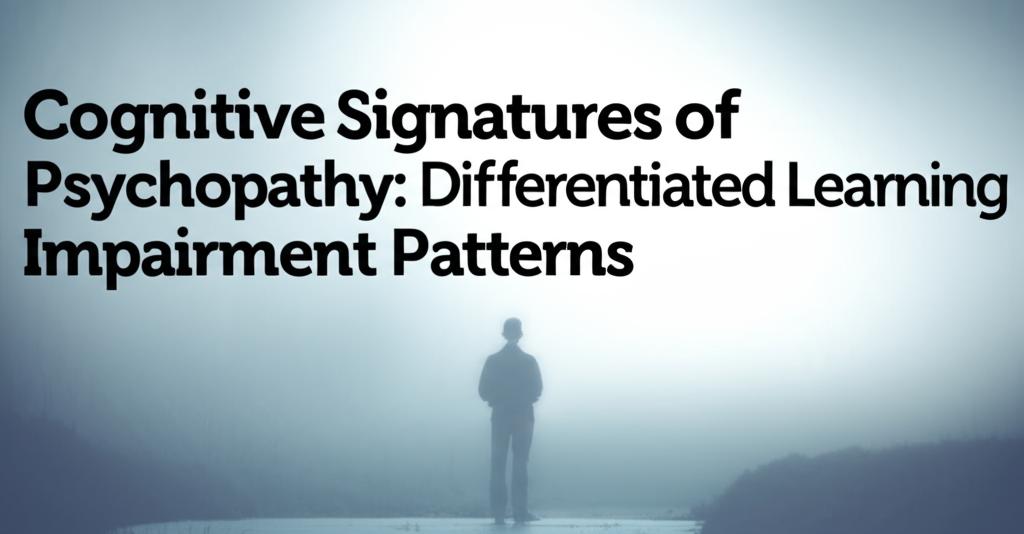Individuals with psychopathy display distinct and differentiated patterns of learning impairments, often failing to adapt their behavior in response to negative consequences. This is not a uniform inability to learn, but rather a more nuanced set of difficulties that vary depending on the specific psychopathic traits and the learning context.
Core Learning Deficits:A prominent characteristic is a deficit in learning from punishment or negative feedback. While they can learn to respond to stimuli associated with rewards, they show significant impairment in learning to avoid stimuli that lead to aversive outcomes like monetary loss or a loss of points. This is often described as a difficulty in adjusting behavior based on unpleasant experiences.
Reinforcement Learning and Prediction Error:Reinforcement learning (RL) models are providing insights into these deficits. A key concept in RL is "prediction error" – the difference between an expected outcome and the actual outcome. Individuals high in psychopathic traits may exhibit a reduced ability to update the value of an action when they successfully avoid a negative consequence. This suggests a problem with how they process and learn from the absence of expected punishment.
The Role of Different Psychopathic Traits:Recent research increasingly emphasizes that different facets of psychopathy are linked to distinct learning impairment patterns:
- Antisocial Traits: Individuals higher in antisocial traits may perceive the environment as more unstable than it actually is. This can lead to poor learning because feedback seems less meaningful if rules are expected to change frequently. This may explain their persistence in maladaptive behaviors despite signals that change is needed.
- Interpersonal Traits: Higher interpersonal traits, such as superficial charm and manipulativeness, have been linked to weaker learning from personally meaningful rewards. These individuals may be less responsive to outcomes that should be motivating, potentially reflecting diminished sensitivity to positive reinforcement.
- Affective Traits: Callousness and lack of empathy (affective traits) are associated with reduced learning from painful punishments. These individuals may show muted brain responses to negative outcomes, failing to effectively adjust their behavior after experiencing punishment. However, some studies suggest they might show stronger learning from personalized rewards, indicating that highly motivating incentives could partially overcome these deficits.
Several theories attempt to explain these learning anomalies:
- Low-Fear Hypothesis: This classic explanation suggests that diminished reactions to threatening stimuli underlie psychopathic features, leading to insufficient learning from negative stimuli. More recent interpretations suggest this might be better defined as a dysfunction in protective abilities related to negative stimuli, rather than a direct impairment in experiencing negative emotions.
- Response Modulation Hypothesis: This theory posits that learning impairments occur because individuals with psychopathy disregard disadvantageous information when focused on a goal-related stimulus. Their deficits in passive avoidance learning, for example, are seen as a failure to process punishment cues that are peripheral to their main attentional focus.
- Stimulus-Reinforcement Learning Deficits: Individuals with psychopathy show impairments in associating a stimulus with its reinforcement value (reward or punishment). This is evident in tasks like aversive conditioning. This deficit extends to processing the emotional expressions of others, which normally help in learning the value of associated actions or objects.
- Attention-Related Deficits: Accumulating evidence suggests that attentional abnormalities are fundamental to the emotional and learning deficits in psychopathy. Deficits in passive avoidance learning and conflict monitoring may appear or disappear depending on how experimental tasks control their focus of attention. Some research indicates that those with elevated psychopathic traits are adept at screening out distracting threat-related and irrelevant information to focus on goal-relevant stimuli.
Neuroimaging studies point to dysfunctions in brain regions critical for learning and emotional processing:
- Amygdala: Reduced amygdala response during aversive conditioning and processing of fearful expressions is a common finding, potentially underlying deficits in fear learning and empathy.
- Orbitofrontal Cortex (OFC): This region, crucial for stimulus-outcome association and adapting behavior after a change in contingencies, is also implicated.
- Ventral Striatum (VS): Impulsive-antisocial traits have been linked to greater VS reactivity during reward anticipation, suggesting a hypersensitivity to potential rewards in this subgroup.
- Anterior Cingulate Cortex (ACC): This area is involved in error monitoring and signaling when outcomes are worse than expected. Some studies have found diminished error-related negativity (an electrophysiological correlate of error monitoring) in psychopathic individuals, suggesting difficulties in using error information to adapt behavior. However, findings regarding fear conditioning and ACC activity can be complex, with some research suggesting inverse patterns of dorsal and ventral ACC activity in primary versus secondary psychopathy during fear learning.
The differentiated learning impairments in psychopathy highlight the complexity of the disorder. Understanding these specific cognitive signatures is crucial for several reasons:
- It moves beyond a simplistic view of psychopaths as merely "unable to learn from mistakes."
- It can inform the development of more targeted and potentially effective intervention strategies. For instance, interventions might need to be tailored based on an individual's specific profile of psychopathic traits and associated learning deficits.
- It underscores the importance of considering the interplay between emotional processing, attention, and learning mechanisms in psychopathy.
In conclusion, the cognitive landscape of psychopathy is characterized by specific and varied learning impairment patterns, rather than a global learning deficit. These patterns are increasingly understood through the lens of distinct psychopathic traits, underlying neurobiological dysfunctions, and the ways individuals with these traits process rewards, punishments, and environmental feedback. This nuanced understanding is paving the way for more sophisticated models of psychopathy and, potentially, more effective approaches to addressing its associated behaviors.

